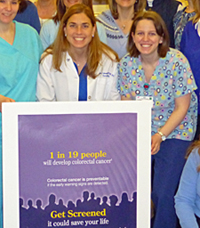 March is as Colorectal Awareness Month, which provides an opportunity to raise awareness of the disease and how it can be prevented through early detection.
March is as Colorectal Awareness Month, which provides an opportunity to raise awareness of the disease and how it can be prevented through early detection.
Colorectal cancer is the third most common cancer in the United States in both men and women. Though it is treatable and preventable, colorectal cancer is the second leading cause of cancer related deaths, with only lung cancer surpassing it. The American Cancer Society projects that 142,820 cases of colon cancer will be diagnosed in 2013 in the United States and that 50,830 will die from the disease this year.
Death rates from colon cancer have declined for men and women the past two decades, which reflects both the declining number of people who are being diagnosed with the disease and, more importantly, improvements in early detection and treatment.
Colonoscopy - The Gold Standard for Colon Cancer Screening
Screening for colon cancer is recommended at age 50, but only 40 percent of people who are eligible for a screening colonoscopy actually schedule one. Many people are uncomfortable discussing this screening procedure and their bodily functions with their doctor. They may shy away from having a screening because it sounds unpleasant.
During a colonoscopy, which is considered the gold standard for colon cancer screening, you are sedated and made comfortable. The procedure itself does not take that much time, but that time could save your life. If you get routine screenings starting at age 50 there is a good chance that if a cancer is detected it can be treated. When diagnosed early, there is a 90 percent survival rate for those with colon cancer.
Colon cancer is considered a silent killer because there are often no symptoms until it has progressed to the point that it is too late for treatment. Symptoms that indicate you may need a colonoscopy include blood in stools, changes in bowel movements, unexplained abdominal pain, anemia or significant weight loss.
Most colon cancers develop slowly over several years. They begin as polyps or lumps on the lining of the colon wall, although not all polyps become cancerous. Regular screening enables gastroenterologists to identify precancerous polyps and remove them before they become cancerous.
During a Colonoscopy
There are a variety of screening methods used to detect and prevent colon cancer, but a colonoscopy is considered the most reliable test. During a colonoscopy a long flexible tube with a camera at the end allows a gastroenterologist to examine the entire inside of your colon and rectum for polyps. If any polyps are found during this exam, the gastroenterologist will remove them and send them to the pathology department for evaluation under the microscope. Other screening methods include flexible sigmoidoscopy, virtual colonoscopy, barium enema, fecal occult blood tests or stool DNA testing.
After your colonoscopy has been completed, you will know if anything was found or removed prior to leaving the hospital. You will be provided with a report and photos from the procedure. Your gastroenterologist will tell you how many polyps were removed and will be able to give you a sense of whether the polyps appear benign or precancerous. Results from any polyps removed during your colonoscopy are usually available within one week.
Age is the Single Largest Risk Factor for Colon Cancer
Some people have a greater risk for developing colon cancer. Age is the single largest risk factor for the disease as your likelihood of developing colon cancer increases with age. More than 90 percent of colon cancers occur in people over 50 years of age. Other risk factors include family history of colon cancer, certain hereditary conditions, prior colon cancer or polyps or inflammatory bowel disease. Some lifestyle factors that may increase your risk include diets high in fat or red meat, low in fiber, smoking and alcohol consumption or a sedentary lifestyle. African Americans are at a higher risk for developing colon cancer and should seek a screening colonoscopy at age 45. Those with inherited syndromes or other increased risk factors may need screening before age 50.
Colon cancers develop slowly. This is why early screening and removal of polyps is such a significant factor in decreasing a person's risk for developing colon cancer. If you are 50 or older and have not yet scheduled your screening colonoscopy, I hope you do so for both your own health and for your family's sake. If you have any questions or would like to schedule this procedure, please discuss it with your primary care physician or your gastroenterologist. Getting yourself to the doctor for your colonoscopy could save your life.
For more information please call us at 603-772-5528